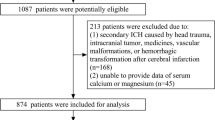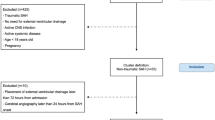Abstract
Magnesium has been reported to have a dilatatory effect on cerebral arteries. Reduction of extracellular Mg+2 has been shown to be directy correlated with the intensity of cerebral spasm. A neuroprotective effect of magnesium in stroke has also been hypothesized. The aim of our study was to examine the Mg+2 levels in serum and cerebrospinal fluid (CSF) in the early stage of stroke and to evaluate the correlation between Mg+2 levels and the development of neurological deficits. Between 1986 and 1994, 96 patients who had a stroke of 24- to 48-h duration were enrolled in the study. Serum and CSF levels of magnesium were checked on admission, 24–48 h after the onset of stroke. Using a neurological score, the neurological deficit was assessed on the 1st day, 1 and 4 weeks later. Computed tomography (CT) was performed after 1 week, and the volume and location of infarction were calculated and measured. Statistical analysis was performed for cortical and subcortical patients separately, using Spearman correlation and multiple linear and logistic regression analyses. Significant correlation was found between CSF Mg+2 and the size of the infarct (P < 0.0001). There was no correlation between serum Mg+2 and CSF Mg+2 levels. Regression analysis demonstrated an increase in the values of the Mathew Neurological Score with higher CSF Mg+2 levels. This association remained true after other factors such as age, associated heart disease, diabetes and infarction size had been taken into account by the regression model. The results confirm that there is a relationship between a low Mg+2 concentration in CSF during the first 48 h after onset of ischaemic stroke and the intensity of the neurological deficit. The therapeutic consequence of this finding may have some importance.
Similar content being viewed by others
Author information
Authors and Affiliations
Additional information
Received: 14 January 1997 Received in revised form: 15 January 1998 Accepted: 24 February 1998
Rights and permissions
About this article
Cite this article
Lampl, Y., Geva, D., Gilad, R. et al. Cerebrospinal fluid magnesium level as a prognostic factor in ischaemic stroke. J Neurol 245, 584–588 (1998). https://doi.org/10.1007/s004150050249
Issue Date:
DOI: https://doi.org/10.1007/s004150050249




